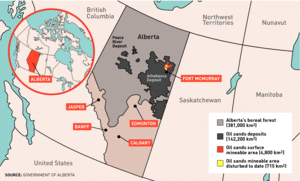
Canada's prime minister, Stephen Harper, is winning praise from the country's energy sector for a decision announced in early December that would prevent the takeover by foreign- and state-owned enterprises, or SOEs, of Canadian energy companies operating in Alberta's oil sands.
The decision to limit foreign investments to non-controlling interests in such companies came on the same day Harper approved the $15.1-billion purchase of Alberta-based Nexen Inc. by China National Offshore Oil Corp. (CNOOC) and the $6-billion purchase of Progress Energy Resources Corp. by Petronas in Malaysia.
"The real question was what the clarity was going to be when it comes to state-owned enterprises," says Greg Stringham, vice president of the Canadian Association of Petroleum Producers. "The clarity pending on both those deals that were approved was very important for us to have."
Less clear was the prime minister's additional statement that an SOE might still acquire majority interest in a company operating in Alberta's oil sands under "exceptional circumstances."
The lack of clarity on what those circumstances might be under the newly revised Investment Canada Act galvanized Harper's critics. Supporters, such as Stringham, were unfazed. He said, "That really means to me that it's not likely to be approved unless a very strong case is made." Meanwhile, pundits and industry insiders are arguing the new rules around SOEs will not impede the ability of Canada's energy sector to raise the $650 billion it needs to exploit oil and gas resources over the coming decade.
Alberta's own energy minister, Ken Hughes, is taking a contrary view. Following the announcement, he told a conference in Calgary that while he does not object to the Nexen-CNOOC deal, "the new rules may reduce foreign investment in the oil sands and drive up the cost of capital for remaining players." His colleague Cal Dallas, minister of international and intergovernmental relations, also wondered how majority ownership will be defined for SOEs still hungry for a larger piece of an Alberta energy firm.
"That may not necessarily be defined by the percentage of interest in an enterprise but may also relate to the apportioning of debt financing and who's responsible for that," Dallas said. "So, there's an issue there to be better understood."
Future Influence
Still left in the air is how much influence an SOE owner of a Canadian company could exert over the industry, especially in a province in which a handful of companies already run the oil patch. But China's rise and wealth, as well as the secretive nature of its investments, has the industry suspicious, especially when the legality of some of China's investment approaches has been challenged. Stung by his decision in 2010 to nix the $40-billion purchase of Canada's Potash Inc. by BHP Billiton, Harper threaded the needle much more carefully this time, balancing a much-needed infusion of cash into an underperforming Alberta oil company with a requirement that foreign corporate investors demonstrate "freedom from political influence."
Some point to the recent news that Calgary-based Encana and PetroChina reached a $2.2-billion agreement to develop the hot, new Duvernay shale-gas play in Alberta as proof the new investment rules will not discourage further investment. Encana spokesman Jay Averill echoed comments by Mike McAllister, acting president of Encana's Canadian division, that ventures for non-controlling interests envisioned under the revised investment act are "very similar" to the agreement with PetroChina announced last week.
"What really encouraged us was that the Canadian government actually singled out joint ventures like [the Encana-PetroChina deal] as being welcome to the development of Canada's economy," Averill told Engineering News-Record. "Something like this is really aligned with what the Canadian government wants to encourage."


Post a comment to this article
Report Abusive Comment